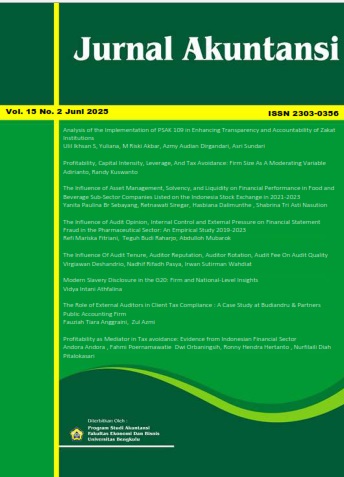Main Article Content
Abstract
Zakat is a key instrument in Islamic economics for wealth redistribution, aiming to reduce social inequality and enhance community welfare. Transparent and accountable zakat management is essential for building and maintaining public trust in zakat institutions. Sharia accounting plays a crucial role in systematically recording, measuring, and reporting zakat finances in accordance with Islamic principles, thereby reinforcing transparency and accountability. This study analyzes the role of Sharia accounting in improving transparency and accountability in zakat management, with a focus on the implementation and challenges of PSAK 109. A qualitative descriptive method is employed, using a literature review of scholarly articles on the application of PSAK 109 in BAZNAS and LAZ. Findings reveal that BAZNAS has effectively implemented PSAK 109, supported by strong regulations, strict oversight, and integrated Sharia accounting systems. In contrast, many LAZ face obstacles, including limited human resources, inadequate technological infrastructure, and weak supervision. To address these issues, efforts should focus on regulatory harmonization, capacity building, digitization of accounting systems, and enhanced oversight by the Sharia Supervisory Board (DPS). Strengthening these areas will enable accounting to contribute more significantly to the professionalization of zakat management, ensuring its distribution is more effective and transparent.
Article Details
Copyright (c) 2025 Ulil Ikhsan S, Yuliana, M Riski Akbar, Azmy Audian Dirgandari, Asri Sundari

This work is licensed under a Creative Commons Attribution-ShareAlike 4.0 International License.
Author retains the copyright and grants the journal the right of first publication of the work simultaneously licensed under the Creative Commons Attribution-ShareAlike 4.0 License that allows others to share the work with an acknowledgement of the work's authorship and initial publication in this journal
Author is able to enter into separate, additional contractual arrangements for the non-exclusive distribution of the journal's published version of the work (e.g., post it to an institutional repository or publish it in a book) with the acknowledgement of its initial publication in this journal.
Author is permitted and encouraged to post his/her work online (e.g., in institutional repositories or on their website) prior to and during the submission process, as it can lead to productive exchanges, as well as earlier and greater citation of the published work (See The Effect of Open Access).
Creative Commons Attribution-ShareAlike (CC BY-SA)
Jurnal Akuntansi is licensed under a Creative Commons Attribution-ShareAlike 4.0 International License.

